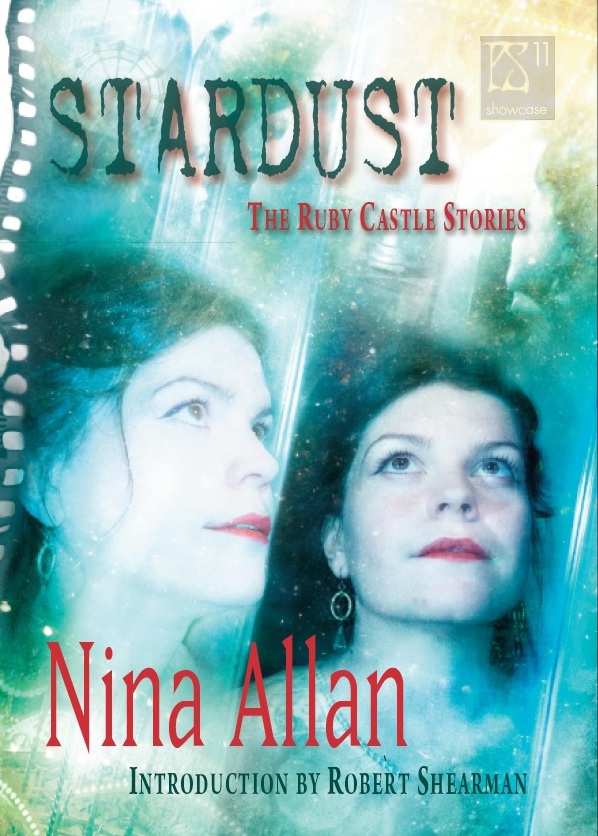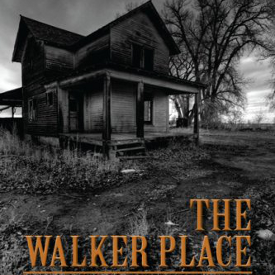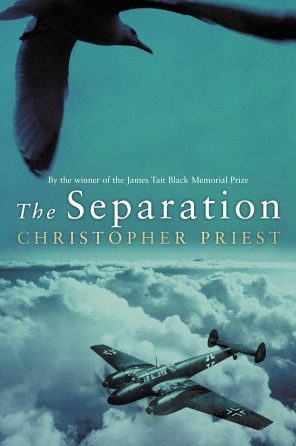 Stardust is one of three books by Nina Allan published so far this year. First was the story collection Microcosmos. Next came the novella, Spin. Now we have Stardust, published as a very striking hardback by PS Publishing as PS Showcase #11.
Stardust is one of three books by Nina Allan published so far this year. First was the story collection Microcosmos. Next came the novella, Spin. Now we have Stardust, published as a very striking hardback by PS Publishing as PS Showcase #11.
Stardust is subtitled The Ruby Castle Stories, but who (or what) is Ruby Castle? Actually Ruby Castle is a person, rather than a place. But these six stories and a poem tell us very little about her. She only appears in one story, and then as a supporting character. In the others we learn a few things about her, primarily that she was a film star, eventually more famous for an act of murder than her on screen work.
In the last and longest story, the 70 page novella ‘Wreck of the Julia’, Ruby Castle is not mentioned. And therein lies a clue to Stardust. This is not Hoagy Carmichael or Woody Allen or Neil Gaiman’s Stardust, but an exploration of something as nebulous, as transparently not here, as the debris between the stars. As the cosmologists remind us, ultimately, on a physical level, we are all stardust, and Nina Allan’s book is about those who are missing, departed, perhaps have returned to dust, but still, as those who profess to read the stars would have it, cast an unfathomable influence on the lives of those who remain. Even though Ruby Castle, film star, distant presence, little more than a reference, star light reflected on a screen, is entirely absent from the final Ruby Castle story, another missing woman is more present. Stardust is about fallout, about piecing the strangeness of the world after some unknowable yet defining event into a narrative which allows us to go on living.
Michael is 13, a potential future chess champion. In ‘B-Side’ we meet him leaving school where he has lost an important match. We never see Lennox, Michael’s mentor, but in the space of a memorable few hours Michael’s sense both of himself and of the veracity of the world is tested. Alina, narrator of the title story, is also 13. Her half-brother Nicky, plays chess. Her guardian wears glasses which remind Alina of Leon Trotsky, just as Lennox’s spectacles remind Michael of the same revolutionary. Stardust is that sort of book, near subliminal details binding disparate tales.
‘The Lammas Worm’ is loosely inspired by the Lambton Worm, the same legend which seeded Bram Stoker’s The Lair of the White Worm, and Ken Russell’s hugely entertaining, barking mad film of the same name. It is the closest Stardust gets to a conventional horror story, a tale of a young girl adopted by a circus with strange consequences and a haunting epilogue. Previously published in a slightly different version in Strange Tales From Tartarus 3, ‘The Lammas Worm’ is the one reprint here.
‘The Gateway’ is a complex novella spanning both sides of the Second World War, a story of friendship, betrayal, an affair, a missing girl. Englishman Andrew is reunited with Thomas, a German friend he lost contact with through the war years. They are bound by painful ties, the mysterious disappearance of Thomas’ young daughter, Claudia, and Andrew’s uncanny experience of the Gleb brothers’ house of mirrors. There are echoes of German folk law, the carnival setting resonates with the circus world of ‘The Lammas Worm’, the character of Martin Foerster provides a connection with ‘Wreck of the Julia’. ‘The Gateway’ is complex in content and structure, time is out of joint, the ending, nominally calm and even consoling, is profoundly unsettling.
In ‘Laburnums’ we meet the poet Christine. There are ‘travelling, three-bit carnivals’, Christine has more than a friendship with the much older poet, Matthew Cleverly, who 30 years before interviewed Ruby Castle in prison, and ten years later published the poem cycle, The High Wire and Other Transgressions, the title referring to Ruby’s circus days. Christine sees a film called The Comet, but it is not the expected film of that title, but one about ‘two female trapeze artists’. Comets are not quite stardust, and anyway, the film Christine was supposed to see is missing. She is haunted by her school friend, Amma, who is no longer there.
The title story may be set in the same world as Allan’s British Science Fiction Association Award-nominated ‘Flying In The Face of God’, which features in Microcosmos. An intricate web of family connections spin out around the day of the Anastasia space disaster, July the tenth 2029. This is not the future Russia we know, and in the aftermath of the disaster the young narrator has an encounter on a train which contradicts the official version of events. Less Capricorn One than the off-kilter kin of the Twilight Zone episode ‘And When The Sky Was Opened’. The ending is deliberately anti-climatic, distant, detached, matter-of-fact, but the story has a powerful grip.
In ‘Wreck of the Julia’ Eloise leaves her husband, Vernon, but she does not die in a plane crash. There are parallel’s with Nina Allan’s story ‘Higher Up’, which ends Microcosmos. Vernon has three deeply disturbing dreams after Eloise’ departure, and then finds those dreams reflected in a painting he buys at an auction. In a story which also features Mark Cleverly, the son of the poet Matthew, Vernon begins a new relationship and goes on a holiday which seems to make his dreams come true. ‘Wreck of the Julia’ is subtly unnerving and very, very clever.
In his introduction Robert Shearman says that Nina Allan described Stardust to him as a novel. It is not. As with Microcosmos, it is a collection, the repetitions of theme and the tapestry of interconnections making the whole more than the sum of the parts. These stories belong together. Like the strings of a piano playing a complex, unresolved chord, they resonant, the harmonies, the overtones becoming something rich and provocative. The emotional quality of these stories is as mysterious as good music, challenging the limitations of language to suggest something beautiful and terrifying.
Stardust is a fine collection, one which grows better on rereading. ‘The Gateway’ alone is so good as to make this an essential purchase for all lovers of the mysterious and enigmatic. Distinctly British in sensibility, Nina Allan’s voice is all her own. Rapidly developing into a major talent in the genre, I eagerly await whatever she writes next.
*
Order Stardust from PS Publishing
Read my reviews of Microcosmos and Spin
Visit Nina Allan’s website, The Spider’s House











4 Comments